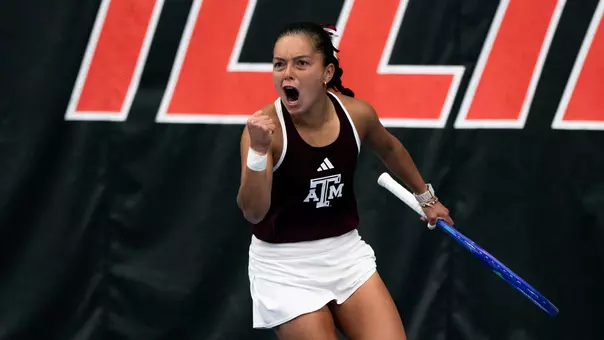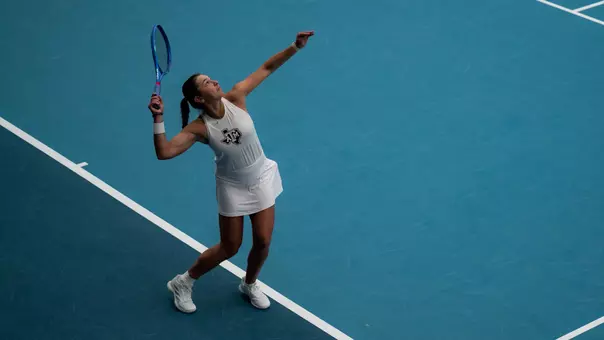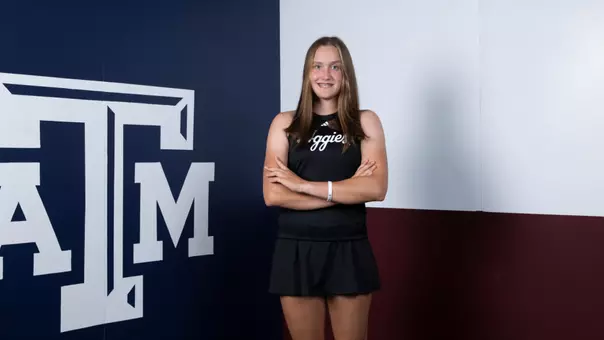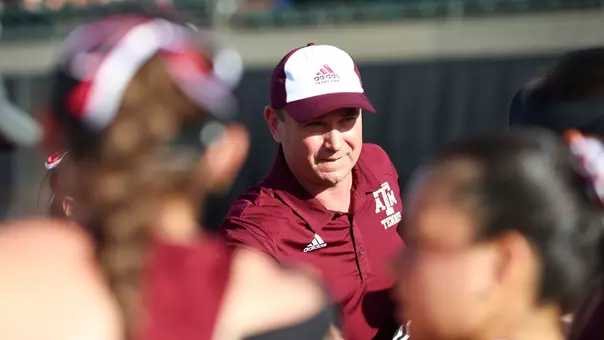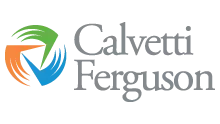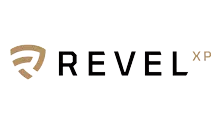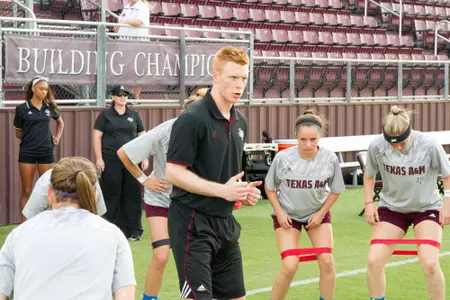
Get to Know Tom Milroy - Texas A&M Sports Performance Coach
Mar 23, 2016 | Soccer, Women's Tennis
Tom Milroy joined the Texas A&M Sports Performance staff in 2014. He is in charge of Sports Performance for the Texas A&M soccer and women's tennis teams. 12thman.com recently caught up with Milroy for a Q&A session to learn about his background and his path to Aggieland.
You're a native of Scotland. Can you tell us about the path you took from growing up there to where you are now with your career in Sports Performance?
"I first came to the U.S. on a soccer scholarship at Montana State University-Billings. When I was about 16 or 17, I decided to look into coming to the U.S. as sort of an adventure. In Scotland, I had the option to either try and play professional soccer, or go to college and study for a degree. We don't have college sports, so I didn't feel like I was going to be able to do both to the level I wanted. I went to a college soccer showcase and got recruited from there, and I haven't looked back since. I've always been obsessed with training, trying to be as fit as possible and training on my own to perform better. While I was in my college classes, I got to learn more of the science behind training and movement. After playing professionally for a short time, I decided to try and come back to the U.S. and use my degree in Exercise Science. I think I wanted to help other college athletes have a great student-athlete experience like I had."
You already had a great background, but you have continued to add multiple certifications over the past several years. What has motivated you to continue advancing in your trade like that?
"One of my mentors once told me, 'buy a book with every paycheck' and I think that is great advice for anyone leaving college and going into the professional world. In Sports Performance and Strength and Conditioning, there is nobody who has all the answers. There is so much to learn. So many of the things that have been done for decades we are now finding maybe can be done more effectively, or in a different way. If I can learn something from someone else or from a certification course that helps me solve a problem or makes our athletes better by even 1 percent, that can make a difference when we are competing in the SEC and on the national level. I've found that asking someone 'why?' is sometimes the most important way to approach things. Understanding different elements from different areas of coaching helps me, and this staff, become better."
You've had the opportunity to work in collegiate and professional athletics. What stood out to you and attracted you to the opportunity of working at Texas A&M University?
"There aren't too many schools where every single team on campus could win a national championship every season. I think being part of a winning culture is what brings a lot of people here. We get the best athletes in the country, and they all want to win. I hate losing. I want to be around winners every day, and those opportunities are special in college athletics. The togetherness of a campus like this just adds to what we are doing every day in Sports Performance. Our staff works with every athlete on campus along with Sports Medicine, Sports Nutrition and Academic Services. I think that just presents a great opportunity as a coach to be part of something that you just can't find anywhere else."
What is the best advice you've been given, both professionally and personally, that drives/impacts you in your career and life?
"In terms of coaching, I think 'Start with Why?' was a book that I read which changed how I coached. That phrase itself is a great thought for communicating with people. How you phrase things and work communication with athletes and teams changes how they perform and respond, and I think that book made me think a little differently.
I once had a teammate who said, 'you learn more from losing than you do from winning', and at that time I had no idea what he was talking about. But I do think that losing is something you take more from, and winning can make you complacent. As a coach, you ultimately want your athletes to learn some life lessons during their time here, whether it is in their sport or in the weight room. The evaluation process when you lose or fail is difficult for anyone, but improving yourself in some way to never lose again, I think, is a great skill that we want to teach."
You are part of an incredibly experienced Sports Performance staff at Texas A&M. How does that staff work together and help each other, and what kind of positives do you see from having such an experienced staff?
"This is one of the most experienced staffs in the country. As a young coach, I am really lucky to have the opportunity to learn from knowledge and experience. Our staff meets once a week to learn together in different areas of Sports Peformance, and I think that helps our full-time staff and interns hear how different coaching approach things. Everybody brings something different to the table, and I think that is what is so great about this staff. I like collaborating on designing programs, because other coaches will see things or think about things that I might not consider, and it makes the program better. Our staff is also spread out across campus, so when we all get together it is a good opportunity to update each other on the progress of their athletes and teams."
Some individuals only think of the weight room when they hear "Sports Performance". There is obviously a lot more to it. How would you describe the role of a Sports Performance Coach, and what are some things you think would surprise some people about the Sports Performance field?
"I think the role has changed a lot, probably in the last five to 10 years especially. We are moving away from just lifting heavy weights and running, which is what people associate the 'weight room' with. We are really looking at all aspects of performance, not just strength and conditioning. Most Sports Performance coaches see their athletes 3-5 hours a week, which is very little in relation to the entire week. Our goal is to to give them the '24-hour athlete' mindset, and that comes first through education. We know that sleep, nutrition, hydration, and stress impact performance, so just lifting weights and running more will not fix that. We are looking at things from a scientific research perspective, and combining that with coaching experience to help our athletes perform as best as they can. You can look at each individual athlete as a puzzle...what is the best way they can stay pain free, healthy and performing at their best? That will change over the course of their career, but our job is to manage that. At the end of the day, our coaches want all their athletes available on game day, ready to play. As they develop over their four or five years with us, we can see their performance improvements as we increase their mobility, stability, strength and power."
You mentioned your interest in the science behind Sports Performance. You have already applied some of that with the teams you work with here at Texas A&M. What can you tell us about that?
"Before I decided to study Exercise Science, I was enrolled in Computer Science. So I have always had an interest in some of the logistics of computer problem solving. As I got into Sports Performance, I started using some different tracking and monitoring tools for my teams that would help me measure the progress of the athletes and to organize things more effectively. In Europe and Australia, Sports Science has been the basis of all Olympic and National development in sports for a long time. In the U.S. strength and conditioning came first, and there has been a big push to look into Sports Science more. Particularly in soccer, there are a lot of useful metrics that can give coaches good information about player performance. We are currently using the Catapult GPS system with women's soccer in order to try and quantify their movements during practice and games. In general terms, we are looking at an overall load on the player, and how that is changing day to day, week to week and month to month. If we see injuries or dips in performance during a certain period, we can go back and look at estimated load they have been under. We've also been looking at it from a 'return to performance' standpoint with some of our injured players, to quantify how much work they are doing during the recovery process. This will never replace the eye of a coach, but it can give us insight into the fitness of the players, prevent overtraining which may lead to injury, and refine how we train in preparation for a game. It will give us the best opportunity to have all our players fit and ready to compete for a national championship." We asked Tanna Burge (Director of Sports Performance) about her vision for Texas A&M Sports Performance. She talked about the "Building Champions" acronym, so I'm sure all of you follow that. However, to go along with that, what's your personal hope and outlook for Texas A&M Sports Performance both now and looking down the road?
"I want our department to continue to be known as one of the best in the country. With the facilities we have, the staff we have put together and Tanna Burge as our director, I don't think we could be in a better situation. I think we can be at the front of the line in terms of how we are training our athletes, the technology we use and how we are applying that through the coaches we have on staff. I hope to get to the point where every student-athlete has an all-encompassing profile to help us monitor and manage sleep, nutrition, recovery and performance. We want our facility to be one of the most positive places on campus, where athletes can really focus on their athletic development and get comfortable being uncomfortable."
You're a native of Scotland. Can you tell us about the path you took from growing up there to where you are now with your career in Sports Performance?
"I first came to the U.S. on a soccer scholarship at Montana State University-Billings. When I was about 16 or 17, I decided to look into coming to the U.S. as sort of an adventure. In Scotland, I had the option to either try and play professional soccer, or go to college and study for a degree. We don't have college sports, so I didn't feel like I was going to be able to do both to the level I wanted. I went to a college soccer showcase and got recruited from there, and I haven't looked back since. I've always been obsessed with training, trying to be as fit as possible and training on my own to perform better. While I was in my college classes, I got to learn more of the science behind training and movement. After playing professionally for a short time, I decided to try and come back to the U.S. and use my degree in Exercise Science. I think I wanted to help other college athletes have a great student-athlete experience like I had."
You already had a great background, but you have continued to add multiple certifications over the past several years. What has motivated you to continue advancing in your trade like that?
"One of my mentors once told me, 'buy a book with every paycheck' and I think that is great advice for anyone leaving college and going into the professional world. In Sports Performance and Strength and Conditioning, there is nobody who has all the answers. There is so much to learn. So many of the things that have been done for decades we are now finding maybe can be done more effectively, or in a different way. If I can learn something from someone else or from a certification course that helps me solve a problem or makes our athletes better by even 1 percent, that can make a difference when we are competing in the SEC and on the national level. I've found that asking someone 'why?' is sometimes the most important way to approach things. Understanding different elements from different areas of coaching helps me, and this staff, become better."
You've had the opportunity to work in collegiate and professional athletics. What stood out to you and attracted you to the opportunity of working at Texas A&M University?
"There aren't too many schools where every single team on campus could win a national championship every season. I think being part of a winning culture is what brings a lot of people here. We get the best athletes in the country, and they all want to win. I hate losing. I want to be around winners every day, and those opportunities are special in college athletics. The togetherness of a campus like this just adds to what we are doing every day in Sports Performance. Our staff works with every athlete on campus along with Sports Medicine, Sports Nutrition and Academic Services. I think that just presents a great opportunity as a coach to be part of something that you just can't find anywhere else."
What is the best advice you've been given, both professionally and personally, that drives/impacts you in your career and life?
"In terms of coaching, I think 'Start with Why?' was a book that I read which changed how I coached. That phrase itself is a great thought for communicating with people. How you phrase things and work communication with athletes and teams changes how they perform and respond, and I think that book made me think a little differently.
I once had a teammate who said, 'you learn more from losing than you do from winning', and at that time I had no idea what he was talking about. But I do think that losing is something you take more from, and winning can make you complacent. As a coach, you ultimately want your athletes to learn some life lessons during their time here, whether it is in their sport or in the weight room. The evaluation process when you lose or fail is difficult for anyone, but improving yourself in some way to never lose again, I think, is a great skill that we want to teach."
You are part of an incredibly experienced Sports Performance staff at Texas A&M. How does that staff work together and help each other, and what kind of positives do you see from having such an experienced staff?
"This is one of the most experienced staffs in the country. As a young coach, I am really lucky to have the opportunity to learn from knowledge and experience. Our staff meets once a week to learn together in different areas of Sports Peformance, and I think that helps our full-time staff and interns hear how different coaching approach things. Everybody brings something different to the table, and I think that is what is so great about this staff. I like collaborating on designing programs, because other coaches will see things or think about things that I might not consider, and it makes the program better. Our staff is also spread out across campus, so when we all get together it is a good opportunity to update each other on the progress of their athletes and teams."
Some individuals only think of the weight room when they hear "Sports Performance". There is obviously a lot more to it. How would you describe the role of a Sports Performance Coach, and what are some things you think would surprise some people about the Sports Performance field?
"I think the role has changed a lot, probably in the last five to 10 years especially. We are moving away from just lifting heavy weights and running, which is what people associate the 'weight room' with. We are really looking at all aspects of performance, not just strength and conditioning. Most Sports Performance coaches see their athletes 3-5 hours a week, which is very little in relation to the entire week. Our goal is to to give them the '24-hour athlete' mindset, and that comes first through education. We know that sleep, nutrition, hydration, and stress impact performance, so just lifting weights and running more will not fix that. We are looking at things from a scientific research perspective, and combining that with coaching experience to help our athletes perform as best as they can. You can look at each individual athlete as a puzzle...what is the best way they can stay pain free, healthy and performing at their best? That will change over the course of their career, but our job is to manage that. At the end of the day, our coaches want all their athletes available on game day, ready to play. As they develop over their four or five years with us, we can see their performance improvements as we increase their mobility, stability, strength and power."
You mentioned your interest in the science behind Sports Performance. You have already applied some of that with the teams you work with here at Texas A&M. What can you tell us about that?
"Before I decided to study Exercise Science, I was enrolled in Computer Science. So I have always had an interest in some of the logistics of computer problem solving. As I got into Sports Performance, I started using some different tracking and monitoring tools for my teams that would help me measure the progress of the athletes and to organize things more effectively. In Europe and Australia, Sports Science has been the basis of all Olympic and National development in sports for a long time. In the U.S. strength and conditioning came first, and there has been a big push to look into Sports Science more. Particularly in soccer, there are a lot of useful metrics that can give coaches good information about player performance. We are currently using the Catapult GPS system with women's soccer in order to try and quantify their movements during practice and games. In general terms, we are looking at an overall load on the player, and how that is changing day to day, week to week and month to month. If we see injuries or dips in performance during a certain period, we can go back and look at estimated load they have been under. We've also been looking at it from a 'return to performance' standpoint with some of our injured players, to quantify how much work they are doing during the recovery process. This will never replace the eye of a coach, but it can give us insight into the fitness of the players, prevent overtraining which may lead to injury, and refine how we train in preparation for a game. It will give us the best opportunity to have all our players fit and ready to compete for a national championship." We asked Tanna Burge (Director of Sports Performance) about her vision for Texas A&M Sports Performance. She talked about the "Building Champions" acronym, so I'm sure all of you follow that. However, to go along with that, what's your personal hope and outlook for Texas A&M Sports Performance both now and looking down the road?
"I want our department to continue to be known as one of the best in the country. With the facilities we have, the staff we have put together and Tanna Burge as our director, I don't think we could be in a better situation. I think we can be at the front of the line in terms of how we are training our athletes, the technology we use and how we are applying that through the coaches we have on staff. I hope to get to the point where every student-athlete has an all-encompassing profile to help us monitor and manage sleep, nutrition, recovery and performance. We want our facility to be one of the most positive places on campus, where athletes can really focus on their athletic development and get comfortable being uncomfortable."
Media Availability: Bobby Shuttleworth
Thursday, December 11
Weekly Press Conference: G Guerrieri
Thursday, October 23
The Aggie Soccer Hour (Ep 7)
Wednesday, October 22
Mizzou Postgame: G Guerrieri, Bella Yakel, Kaylee Noble
Thursday, October 16
